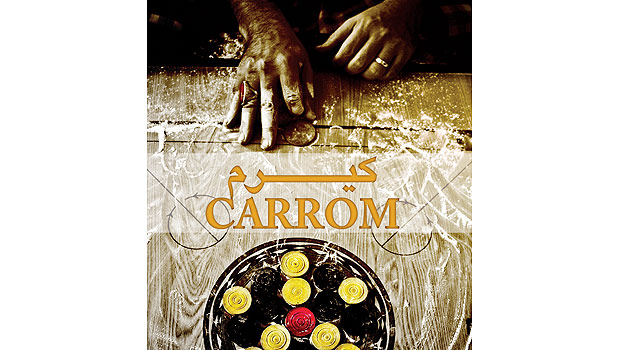“Carrom,” an eight-minute-long short film, written and directed by Hamza Tarzan and starring Mohammad Kurdi, opened to a screening two weeks ago at Tujjar Jeddah.
The film is a brief yet poignant narrative about a middle-aged man named Abu Hanan, who is living alone and prepares the evening for a game of carrom by himself. The entire plot revolves and develops around the dialogue and mental chatter between himself and his alter state. It is quite clear that the protagonist is suffering from a dissociative personality disorder in the most extreme sense of understanding or has quite simply learned to find a friend within himself.
The character in his personal dichotomy contributes to the progression of the story where he learns and takes off from his anti-self, and in the process, each understand their respective standing in life. While the entire film is technically mono-charactered, the pugnaciousness of Abu Hanan’s alter ego brilliantly supplants the melancholy of Abu Hanan himself, thereby providing a variant in the mood of the dialogue.
While the two of them begin to explore his personal predicaments and dissect emotions in the course of their conversation while playing carrom, Abu Hanan advances his own self-awareness in his shared dialogue with his perceived self, pointing to the lonely lives most of us lead in our yearning for companionship. In this character’s case, he waits for his beloved daughter with a hope for her to visit and join him in the game. In the absence of a nurturing emotional requirement, he suffers for his fractured relationship with the outside world, raising concern toward the myriad of mental conditions and situations existent in the fabric of society today, in lieu of such pathetic environments.
I quizzed the director about the subtle and indistinct message of the movie and he said: “I don’t really like to tie causes with a movie to gain sympathy votes. I try to avoid using emotions to reach whatever professional motives I have. I just want to show you the door and allow you to think for yourselves. My only goal is to make you think, and that’s what I will continue to do with the rest of my career as a filmmaker.”
“There are two messages really. One reflects the human side of the character who is neglected,, and the other how we have lost the true essence of the Hijazi culture. The two characters reflect each side of the culture and how things are changing in the need for Westernization. We miss the feeling of being a Hijazi without shallowness, hypocrisy and showing off. We are all going to die one day. Just be kind to one another. If we look into the structure of the families here, there are a lot of problems. The fast pace of life requires one to stay away from building strong and real human relationships, which are creating this divide,” he further explained.
While directing mainstream feature films may still pose multiple obstacles due to the lack of appropriate talents, a regulated cinematic industry and the finances necessitating such a venture, filmmaking is the only medium Tarzan finds himself pursuing seriously.
“For me, my picture is dear. It’s like filmmaking is my only wife at this point. It has made me stronger,” he laughs.
In all totality, the film was well written and directed although character enhancement could have taken a far greater depth with a key focus on some technical cinematographic effects to facilitate the same.
It is a story that will not leave you all fuzzy and warm-hearted but will put you in a state of disarray, discomfort and pure wonder. While the film may be far from leaving a comforting “the end,” it is sure to stir consciences and rouse your emotional empathies toward those we choose to ignore…









